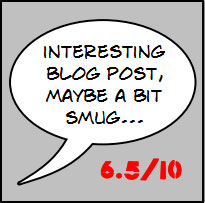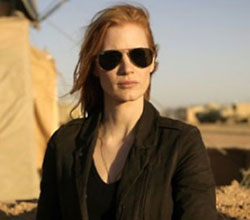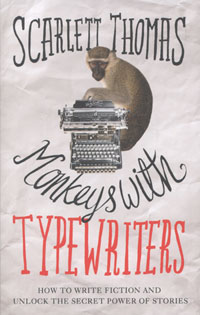As a brief scan of this blog will reveal, I write a lot of reviews. It has now reached the stage where I can formulate a review of a TV show (or other things, but often TV) in a very short space of time.
So, since it’s something I have been asked for advice on, I figured the art of reviewing warrants a blog post. How do I assess stuff? Is there a technique, or do I just splurge?
And yes, some of this will be specific to reviewing TV shows, as that is my area.
How much synopsis?
This is fundamental, and the main thing that annoys me when I read some online reviews: do we need an epic, blow-by-blow description of the entire story? Isn’t that what Wikipedia’s for? If your article is headed “recap”, fair enough, but if your “review” is a painstaking description of the story, with a few words of opinion at the end, that seems bad form.
Of course, do mention plot points when you have an opinion to give about them, but synopsis without opinion is like a sheep with no wool or meat – cold and unappetising. (Or something.)
How much spoiler?
Spoiler use, however, is more personal preference. For TV reviews, especially episodes which aren’t the very first, I tend to write for an audience who have already seen it. So, yes, full spoilers in effect, complete with a warning.
On the other hand, for books or films, the audience might be reading your review for purchasing recommendations. So I avoid spoilers, especially last-third ending spoilers, and when I do give them, they’re clearly labelled or really vague.
But to be honest, there’s not a “right” answer here. Still, worth thinking about before ploughing ahead gleefully.
How much moaning?
How negative to go is another big question, and I could easily do a whole post on this alone. One day, I still might. But in general: there is a lot of negativity on the internet, because, hell, it’s easy to be snide. I try not to review things I know I’ll hate, because I don’t think the rage of someone who would never have liked the show in the first place is useful.
Case in point: over the last few years, various internet people tried to cover The X Factor. We mostly did this, to be honest, because others were doing it and seemed to be getting attention. Many of these faded away, and the ones that did well and thrived were write-ups like Stuart Heritage’s Guardian pieces which, yes, were glib and jokey, but still genuinely enjoyed X Factor when it was getting things right.
Hence why me writing about The X Factor was pointless, but I let myself give often-negative reviews to Sky1’s Sinbad, because although it wasn’t a great show, it was in my wheelhouse – family-aimed fantasy drama, yes, I’ve reviewed that. I truly wanted Sinbad to be good, I’m always happy for decent shows in that genre, and I made sure to acknowledge when it had a strong week.
In short, decent reviewing should come from a place of wanting to be positive. Grumpy, well-known reviewin’ misanthropes like Yahtzee Croshaw of Zero Punctuation and Charlie Brooker may overplay minor annoyances for comic effect, but they also tell you emphatically when they’ve found something they like, and that’s a major reason they have credibility.
There are other things I could write about, like structuring your reviews (try to structure by point, storyline or theme, as opposed to banging through in story order), but I’ve covered my main issues, really. And now you too could become a well known reviewer of TV shows online! (We’re looking for people on The Digital Fix TV site if you want to have a go. Email me. Self-service ends.)
As ever, add your own advice below, or tell me I’m talking complete arse. And obviously, like all my reviews, the above is just my personal opinion. Now, I’m off to review Black Mirror.





